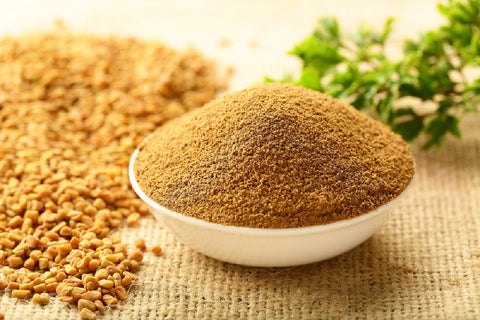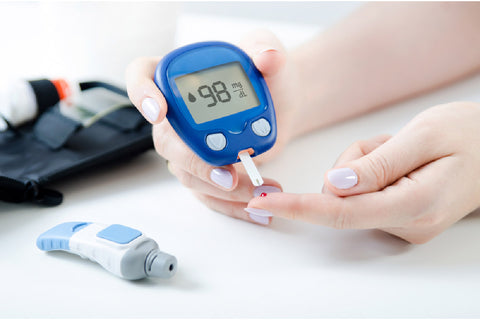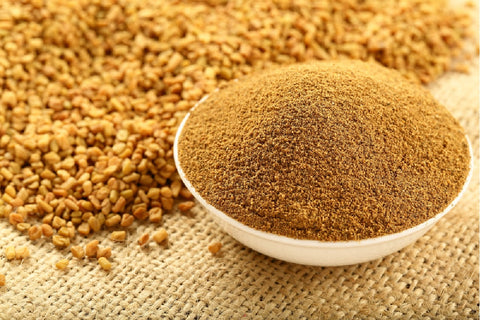Fenugreek powder, which has long been used as a traditional diabetes treatment, has gained popularity in India as a supplement with numerous possible health advantages. Diabetes is a chronic health condition that affects both our bodies and our lifestyles, and many foods exacerbate the illness. Our bodies break down food to produce energy in the form of glucose, which is then released into the bloodstream.

However, having too much glucose in your system might lead to diabetes complications because it disrupts insulin levels. Fenugreek Powder is believed to increase insulin sensitivity and decrease glucose absorption. This article will go into detail on the benefits of fenugreek powder for type 2 diabetes, including potential health benefits, precautions, and hazards, as well as recipes for using it.
Benefits Of Fenugreek Powder For Diabetes Management
Fenugreek powder is an herbal alternative supplement for controlling diabetes, as it can help improve insulin sensitivity, delay tactics, glucose absorption and much more. Let's see some of the benefits of fenugreek powder for diabetes management.
1. Improve Insulin Sensitivity
Fenugreek powder is known for improving insulin sensitivity, but why does your body need better insulin sensitivity? Well, insulin sensitivity refers to how your body responds to release insulin. High sensitivity means your body effectively absorbs glucose and reduces blood sugar.

If the sugar spike doesn't go down, over time, it can cause kidney failure, heart disease, vision loss, etc. Studies suggest that consuming fenugreek powder for ten days can control insulin production and lower blood sugar.
2. Delay Gastric Emptying
Your body has a biological clock that determines the eating and sleeping time, and when you disrupt your biological clock, your sugar level gets worse. Gastric emptiness refers to a person's system's ability to digest food after eating. When your system is empty, it temporarily raises your blood sugar, which spikes your diabetes.

Many studies have demonstrated that fenugreek powder and milk can delay gastric emptiness for a long time and prevent a sudden rise in blood glucose levels.
3. Reduce Glucose Absorption
When a person has diabetes, their body doesn't make enough insulin required and also doesn't effectively use the released one, which causes a sudden spike in blood glucose and causes weakness. High sugar can cause hyperglycemia is a common disease caused by high blood sugar.
Multiple studies suggest that fenugreek powder increases glucose absorption rate in your body to prevent kidney, heart and vision disease and also absorbs glucose from your intestine and prevents hyperglycemia.
How To Use Fenugreek Powder For Diabetes Management?
Fenugreek powder is a very versatile ingredient that can be easily incorporated into your routine in many ways. Here are a few ways to use fenugreek powder for diabetes management.

1. Fenugreek Water
Step 1: Soak one spoonful of fenugreek seeds in a glass of water overnight.
Step 2:Consume the water on an empty stomach in the morning.
Step 3: start the day with a natural blood sugar management boost.
2. Fenugreek Powder
Step 1: Roast the fenugreek seeds and ground them to a fine powder.
Step 2: Mix a pinch of this powder into your soups, stews, or yoghurt.
Step 3: This can be a tasty and nutritious complement to your everyday meals.
3. Methi Dana Tea
Step 1: Boil a teaspoon of fenugreek seeds in one cup of water.
Step 2: Strain the seeds and sip the tea.
Step 3: Enjoy this warm beverage for its potential blood sugar-lowering effects.
Precautions While Taking Fenugreek Powder
1. The most important thing to do before taking fenugreek powder is to consult with your doctor since some medical conditions do not respond well to it.
2. Consult your doctor about the safety of fenugreek powder in your body, particularly if you have hypoglycemia (low blood sugar), blood clotting issues, or are pregnant.
3. Avoid using fenugreek around children; nevertheless, fenugreek can be ingested by babies in moderation and as directed by a doctor as a supplement.
Fenugreek Powder Side Effects For Diabetes
According to the nutrition expert, as with other blood sugar-lowering herbs, taking too much fenugreek can cause blood sugar levels to drop too low. And we all know that low blood sugar is just as concerning as high blood sugar levels.

When methi seeds are consumed in conjunction with prescription medication, this may pose a risk. As a result, the dosage of your antidiabetic medication may need to be adjusted. So, while you should exercise caution when consuming methi seeds, you should also maintain a healthy diet and exercise routine.
Conclusion
Fenugreek Powder has a variety of health advantages and can help manage diabetes. It is best to start with tiny quantities and watch your body's response. Before making significant changes to your diabetes management practice, including the addition of fenugreek, Consult with your healthcare practitioner for personalised recommendations based on your specific health situation. Purchase fenugreek powder from reliable vendors that supply 100% pure and high-quality fenugreek powder. Visit www.VedaOils.com to receive a discount on your first bulk order of fenugreek powder for diabetes treatment.
FAQs: Fenugreek Powder For Diabetes Management
Q1: Can Fenugreek Seeds Help In Diabetes Management?
Ans: Yes, fenugreek seed powder has been shown in several trials to help patients with type 2 diabetes lower their blood glucose levels. This powder works as an antidiabetic, lowering fasting blood glucose levels and improving glucose tolerance.
Q2: How Much Fenugreek Should I Take To Lower My Blood Sugar?
Ans: To treat type 2 diabetes, take ten grams of fenugreek powder soaked in hot water once a day, as directed by your doctor.
Q3: What Is The Best Way To Take Fenugreek Seeds For Diabetes Control?
Ans: The best approach to consuming fenugreek seeds for diabetes control is to prepare tea from them. Fenugreek seed and dried leaves can be cooked together in a cup of water for 10 minutes. Strain the liquid and drink it twice a day to reduce blood glucose levels.













 Sign in
Sign in Register now
Register now My Reward Points
My Reward Points









